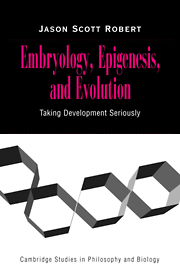6 - A New Synthesis?
Published online by Cambridge University Press: 10 July 2009
Summary
It may seem mystical to suggest the biology is not ‘molecular’ at its core the way physics and chemistry are. But suppose it is not the genome that is especially conserved by evolution. Suppose the ephemeral phenotype really is what we need to understand and what persists over time. Genes would then be ‘only’ the meandering spoor left by the process of evolution by phenotype. Perhaps we have hidden behind the Modern Synthesis, and the idea that all the action is in gene frequencies, for too long.
– Kenneth Weiss and Stephanie Fullerton (2000)There is much more to both evolution and development than we can learn from focusing primarily on genes. However, this realisation is hard won, given the recent history of biology, and of philosophy of biology. I noted in Chapter 4 that the twentieth century witnessed the biological reconceptualisation of evolution in terms of changes in gene frequencies in a population, and of development in terms of gene expression. Moreover, although philosophers have long been preoccupied with evolutionary theory, and more recently with molecular biology, they have engaged far less frequently with development. Whereas historians of biology have been long intrigued by embryology, philosophers have tended to shy away. Yet times have changed. It is mainly as a result of recent work in developmental and molecular biology that some of the reductionistic biases of genetics have paradoxically come to be seen as constricting future research and precluding genuine understanding of both development and evolution.
- Type
- Chapter
- Information
- Embryology, Epigenesis and EvolutionTaking Development Seriously, pp. 93 - 108Publisher: Cambridge University PressPrint publication year: 2004

